Social media platforms, including Twitter, Facebook, blogs, talk shows, and other forums offer opportunities for activists and community members to share, connect, and disseminate ideas about school closure. The virtual connections offered online can extend to personal and political connections through community activist work, strengthening the ties between neighbors, teachers, parents, students and community members and including multiple voices in the discourse around public school closure. Many of these organizations help to link similarly-minded grassroots organizations around the country.
The ten organizations and individuals listed below engage with social media to expand the conversation around school closure. The brief descriptions originate from information shared on each group’s main website.
Chicago, IL
 1. VOYCE (Voices of Youth in Chicago Education) (@VOYCEProject and on Facebook)
1. VOYCE (Voices of Youth in Chicago Education) (@VOYCEProject and on Facebook)
Voices of Youth in Chicago Education is a racial justice-oriented youth collaborative consisting of members of five community organizations across the city. VOYCE uses youth-driven research to attempt to increase Chicago’s graduation rate, paying particular attention to the school-to-prison pipeline, the potential of restorative justice practices, and the difficulties inherent in high-stakes testing. In the spring of 2013, members of VOYCE joined other students and community members in a city march and boycotted a required standardized test to protest the CPS school closure proposal.P17
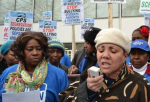 2. Action Now (@ActionNowChi and on Facebook)
2. Action Now (@ActionNowChi and on Facebook)
Action Now brings together workers and families to address multiple issues in the community, including public education, wages, housing, civic engagement, and corporate accountability. In their work in public education, Action Now members fight against school closure because of its effect on communities, its racial targeting, and its displacement of students and teachers. Action Now is working to increase knowledge about Local School Councils (LSCs) and their role in bringing control of public schools to the community members. In January 2014, Action Now parent leaders protested the expansion of charter schools in communities with recent school closures.P18
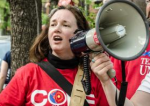 3. Michelle Gunderson (based in Chicago) (@MSGunderson and on Facebook)
3. Michelle Gunderson (based in Chicago) (@MSGunderson and on Facebook)
Michelle Gunderson has taught in the Chicago Public Schools for 27 years, currently teaches fourth grade, is a doctoral student in education at Loyola Chicago, and is the functional VP for the Chicago Teachers Union. Gunderson developed her own Personal Pledge for the Ethical Use of Student Data as an effort to raise awareness about the misuse of student testing data, including for ability sorting, as punishment (summer school/retention), and as justification for privatization of public schools (low-performing schools are starved for resources, deemed inefficient, closed, and replaced with privately-owned charter schools). In January 2013, Gunderson engaged in activism in Chicago to emphasize the importance of saving neighborhood schools from closure.P19
New York City, NY
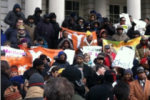 4. New Yorkers for Great Public Schools (@NY_GPS and on Facebook)
4. New Yorkers for Great Public Schools (@NY_GPS and on Facebook)
NYGPS were active preceding the 2013 mayoral election and have attempted to undo damaging education policies set forth by Mayor Bloomberg. They petitioned to place a moratorium on school closings and colocations (charter schools located in shared public school space) and protested at city hall against school closings and cuts to public school librarian positions. With the election of Mayor de Blasio, NYGPS spokesperson Zakiyah Ansari, a parent of eight children who attended NYC public schools and a fierce critic of public school closure, was selected as a member of the new mayor’s transition team and is involved with educational policy decisions. While the group itself is not presently active, their missions are continued through members in the field including Ms. Ansari.P20
Philadelphia, PA
 5. Caucus of Working Educators (Philly) (@CaucusofWE and on Facebook)
5. Caucus of Working Educators (Philly) (@CaucusofWE and on Facebook)
The Caucus of Working Educators is a diverse group of current and former members of the Philadelphia Federation of Teachers (including teachers and school professionals) who seek to build the quality schools that the children of Philadelphia deserve. CoWE aims to work with parents, families, and communities, to encourage transparency and accountability in school-related decision making, to preserve public education as an institution, to remedy underresourced school circumstances, to oppose racism and discriminatory practices, and to encourage teaching and resist testing. In November 2014, CoWE held its first convention and discussed charter school expansion, public school closure, and ways in which its current members can mobilize against these forces.P21
Washington, D.C.
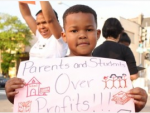 6. Grassroots DC (@Grassroots_DC and on Facebook)
6. Grassroots DC (@Grassroots_DC and on Facebook)
Grassroots DC aims to provide computer training to low-income residents of DC. Additionally, the organization provides media coverage of many issues that affect low-income communities of color in the city. The Education section of their website includes articles on DC school closures (Bruce Monroe and River Terrace Schools specifically), activism around school closure including pending litigation against the city, and lively comment sections where community members engage in in-depth discussions about the issues and their personal experiences.P22
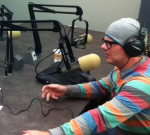 7. Shaun Johnson (the Chalk Face) (based in DC) (@thechalkface and on Facebook)
7. Shaun Johnson (the Chalk Face) (based in DC) (@thechalkface and on Facebook)
Shaun Johnson, a former professor and current kindergarten teacher, has hosted a weekly progressive, pro-public education blog talk radio show for the past five years called @ The Chalk Face Radio. He discussed numerous education issues with activists, educators, and scholars as guests on his show. Johnson addresses school closures in this blog post about education reform and reproductive rights, this blog post discouraging people from entering the teaching profession through Teach for America, this radio show with CTU president Karen Lewis, and this radio show with Zephyr Teachout. While the radio show is presently on hiatus and Johnson does not know if he will continue in this work, his radio shows, blog posts, and active social media use continue the dissemination of progressive education resources.P23
National Organizations
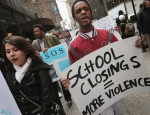 8. Journey for Justice Alliance (@J4J_USA and on Facebook)
8. Journey for Justice Alliance (@J4J_USA and on Facebook)
Journey for Justice Alliance is a collaborative group of community-based organizations across 21 cities who share the aim of resisting the privatization and dismantling of public school institutions. In May 2014, J4J sent an open letter to Eric Holder and Arne Duncan, asking them to look into the racially discriminatory school closings in New Orleans, Chicago, and Newark. Also in May 2014, Journey for Justice released an extensive research report entitled “Death by a Thousand Cuts: Racism, School Closures, and Public School Sabotage” to uncover policies that underenroll, underfund, and overtest the most disadvantaged students in these cities, often targeting low-income communities of color.P24
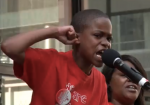 9. National Opportunity to Learn Campaign (@OTLCampaign and on Facebook)
9. National Opportunity to Learn Campaign (@OTLCampaign and on Facebook)
The National Opportunity to Learn Campaign is a coalition of advocates and organizers who believe in quality public education for all children. They cite the recent focus on the achievement gap and testing and instead encourage a focus on the opportunity gap, often felt by low-income students of color. Their website features blogs, resources, and videos that discuss current issues in education such as school closure. In May 2013, the National OTL Campaign released a series of infographics demonstrating the harm of school closures. The four infographics include “The Cycle of School Closures,” “The Color of School Closures,” “Debunking the Myths of School Closures,” and “Alternatives to School Closures.“P25
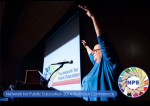 10. Network for Public Education (@NetworkPublicEd and on Facebook)
10. Network for Public Education (@NetworkPublicEd and on Facebook)
The Network for Public Education is an advocacy group that aims to protect quality public education across the country and builds alliances with community-based grassroots organizations. In their positive agenda, they list that they support helping struggling schools rather than closing them. Their site also hosts numerous articles on school closings around the country, including three on grassroots activism in Chicago (one in May 2013, one in June 2013 on lawsuits against the CPS, and one in June 2013 on student activism).P26
